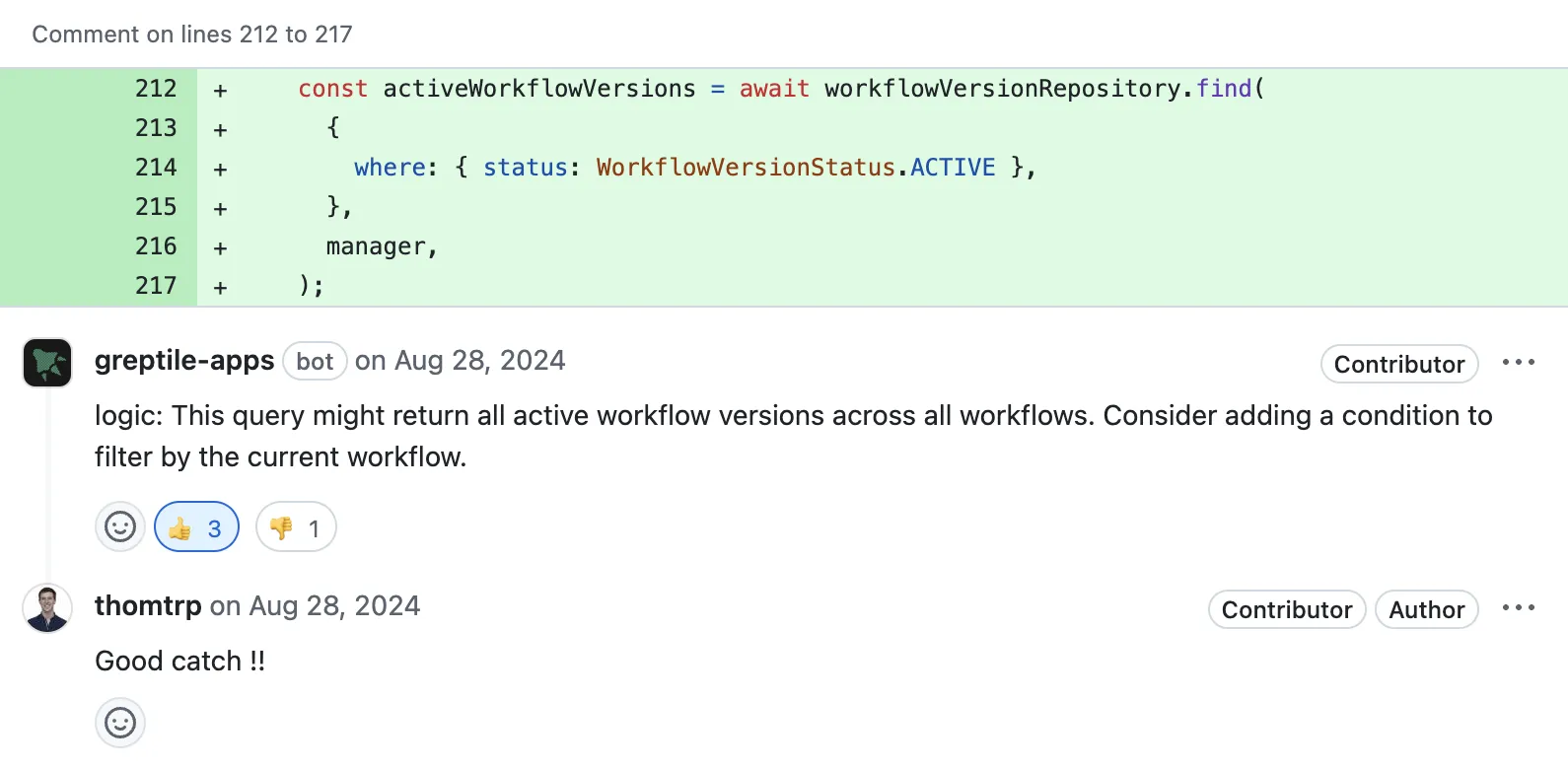Would you trust someone to review your code without knowing how it works?
Of course not. So why do we expect AI to do better?
[AI code review tools](https://www.greptile.com/blog/ai-code-review) are becoming increasingly popular. They promise to streamline workflows, catch bugs early, and improve code quality. But here's the catch: most AI code review tools fall short because they lack codebase context.
Without understanding the broader ecosystem of your project, these tools can't deliver the insights you need. Let's dive into why codebase context is critical and how tools like Greptile are solving this problem.
Why Codebase Context Matters in AI Code Reviews
When developers review code, they don't just look at the lines in front of them—they consider how those changes fit into the entire codebase. They think about dependencies, potential side effects, and whether the changes align with the project's architecture. Unfortunately, most AI coding tools today operate in a vacuum, analyzing individual pull requests (PRs) or files without understanding the bigger picture.
Here's what happens when AI lacks codebase context:
-
Missed Antipatterns and Bugs: Without seeing how code interacts across files, AI tools can't spot subtle issues like circular dependencies, memory leaks, or security vulnerabilities.
-
Shallow Suggestions: Tools like GitHub Copilot or CodeReviewBot.AI might flag syntax errors or style issues but fail to provide meaningful fixes for complex problems.
-
Inefficient Onboarding: New developers struggle to understand legacy codebases because AI tools can't explain how everything fits together.
How Greptile Solves the Context Problem
Greptile AI takes a fundamentally different approach by analyzing entire codebases and building a detailed graph of dependencies and relationships. Here's how it works:
-
Full Codebase Analysis: Greptile scans your entire repository, understanding how files and functions interact. This allows it to catch issues that other tools miss.
-
In-Line Fixes: Beyond flagging problems, Greptile provides actionable fixes for minor issues like syntax errors or security gaps.
-
Natural Language Summaries: Greptile generates plain-English summaries of PRs, making it easier for teams to understand changes.
-
Cross-Language Support: With support for 30+ languages, Greptile can handle complex, multi-language projects.
Greptile in Action: Why Codebase Context is Critical
Let's take a closer look at how Greptile AI provides context-aware code reviews. Below is an example of a Greptile code review in action:

Greptile providing a context-aware code review
In this example, Greptile identifies a potential issue that could lead to unintended behavior. Without filtering by the current workflow, the query retrieves all active versions across all workflows, which might not be the intended outcome. This kind of insight is only possible because Greptile understands the broader context of the codebase, including how the workflowVersionRepository is used elsewhere.
1. Understanding the Data Model
To identify the issue, Greptile needed to understand the data model of the application. Specifically:
- What is a workflowVersion?
- How is it related to a workflow?
- What does the status: WorkflowVersionStatus.ACTIVE condition imply?
Without this knowledge, an AI tool might assume the query is fine. But Greptile, by analyzing the entire codebase, knew that:
- A workflowVersion belongs to a specific workflow.
- The query could unintentionally fetch active versions from all workflows, not just the one relevant to the current operation.
2. Recognizing the Business Logic
The query's intent was likely to retrieve active versions for a specific workflow, not all workflows. Greptile inferred this by:
- Analyzing how workflowVersionRepository is used elsewhere in the codebase.
- Understanding the business logic behind workflows and their versions (e.g., workflows might represent processes like order fulfillment, user onboarding, etc.).
Without codebase context, an AI tool wouldn't know whether fetching all active versions was intentional or a mistake.
3. Identifying Potential Side Effects
Greptile also considered the implications of the query:
- Performance Impact: Fetching all active versions across workflows could result in a large dataset, slowing down the application.
- Logical Errors: If the code assumes it's working with versions from a specific workflow, it might behave incorrectly when given data from multiple workflows.
By understanding the broader context, Greptile could flag this as a potential issue rather than assuming it was intentional.
4. Suggesting a Context-Aware Fix
Greptile didn't just point out the problem—it provided a context-aware solution:
"Consider adding a condition to filter by the current workflow."
This suggestion implies that Greptile knew:
- The workflowVersionRepository likely supports filtering by a workflowId or similar field.
- The current workflow's ID is available in the context where this query is executed.
Without codebase context, an AI tool might suggest a generic fix (e.g., "add a filter") but wouldn't know what to filter by or why.
Why Shallow AI Tools Would Miss This
Most AI code review tools operate on isolated snippets of code. They might flag syntax errors, style issues, or even simple logical errors, but they lack the ability to:
- Analyze how the snippet fits into the larger codebase.
- Understand the data model and business logic.
- Identify potential side effects of the code.
For example:
- GitHub Copilot: Might suggest a syntax improvement but wouldn't catch the logical flaw.
- CodeRabbit.AI: Could flag the query as potentially risky but wouldn't know how to fix it.
- Static Analysis Tools: Might warn about performance issues but wouldn't connect them to the broader context.
How Greptile AI Delivers Where Others Fall Short
Greptile's ability to analyze entire codebases sets it apart. By building a detailed graph of dependencies and relationships, it can:
- Understand the data model and business logic.
- Identify hidden antipatterns and potential side effects.
- Provide actionable, context-aware suggestions.
Greptile's deep understanding of the codebase allowes it to catch subtle but significant issues and suggest fixes that align with a project's architecture and goals.





